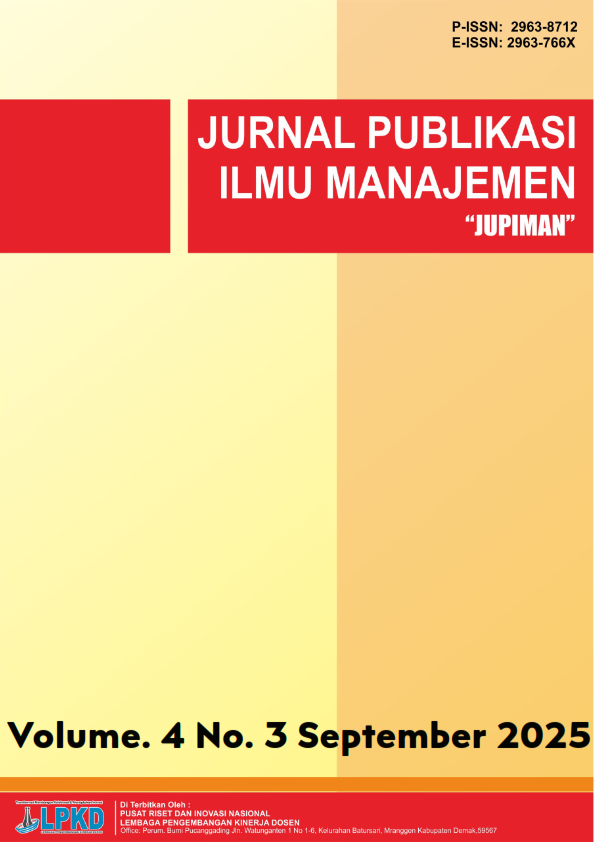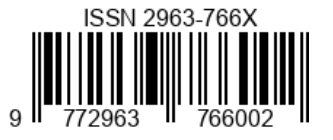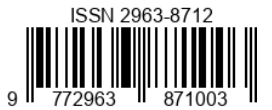Penjualan Es Kul Kul Di Kawasan UINSU Guna Membangun Jiwa Kewirausahaan Dalam Mahasiswa
DOI:
https://doi.org/10.55606/jupiman.v3i1.3306Keywords:
Es kul-kul, entrepreneurship, buildingAbstract
Frozen banana ice, or what used to be called ice kul kul, is actually not a new product. This type of dessert has actually been known for a long time, but because its shape is too simple, it is not very popular. Developing an entrepreneurial spirit in students is one way or alternative to overcome the problem of unemployment in Indonesia. That's why undergraduate graduates are directed and guided so that they don't just think about becoming a job seeker. This research is descriptive qualitative research. Data sources consist of primary data and secondary data. Primary data comes from student practice and observation. students can develop students because entrepreneurship can benefit themselves and others. This course requires students to practice directly in practice, so that it can build an entrepreneurial spirit in students. So from these activities they can gain a lot of experience on how to do business properly and correctly. Market their products in a way that makes them known to many consumers, without violating ethics.
Downloads
References
Achmad, S. (2016). Pengaruh Kepribadian, Lingkungan Keluarga Dan Pendidikan Kewirausahaan Terhadap Minat Berwirausaha Mahasiswa Program Studi Akuntansi Universitas Negeri Yogyakarta. Journal of Chemical Information and Modeling, 12.
Andespa, R. (2017). Pengaruh budaya dan keluarga terhadap minat menabung nasabah di bank Syariah. Maqdis:Jurnal Kajian Ekonomi Islam, 2(1), 35–49.
Dzulfikri, A., & Kusworo, B. (2017). Sikap, Motivasi, dan Minat Berwirausaha Mahasiswa di Surabaya. JKMP (Jurnal Kebijakan Dan Manajemen Publik), 5(2), 183–200. https://doi.org/10.21070/jkmp.v5i2.1310
Elfandi, A., Yohana, C., & Fidhyallah, N. F. (2021). Faktor-Faktor yang Mempengaruhi Intensi Berwirausaha pada Mahasiswa Universitas di Jakarta. Jurnal Bisnis, Manajemen, Dan Keuangan, 2(1), 228–240.
Johnson, A. J., Dibrell, C. C., & Hansen, E. (2009). Market orientation, innovativeness, and performance of food companies. Journal of Agribusiness, January.
Kusnawan. (2017). FAKTOR-FAKTOR YANG MEMPENGARUHI MINAT BERWIRAUSAHA PADA MAHASISWA Kusnawan. Jurnal Elektornik REKAMAN (Riset Ekonomi Bidang Manajemen Dan Akuntansi) Sekolah Tinggi Ilmu Ekonomi Galileo, 1(1), 89–99. file:///C:/Users/Lenovo/Downloads/FAKTORFAKTOR_YANG_MEMPENGARUHI_MINAT_BE.pdf
Marini, C. K., & Hamidah, S. (2014). Pengaruh self-efficacy, lingkungan keluarga, dan lingkungan sekolah terhadap minat berwirausaha siswa SMK jasa boga. Jurnal Pendidikan Vokasi, 4(2), 195–207. https://doi.org/10.21831/jpv.v4i2.2545
Oktarina, H., Agung, E. A., & Aswad, S. H. (2019). Faktor-Faktor Yang Mempengaruhi Minat Berwirausaha (Studi Kasus Mahasiswa Program Studi Pendidikan Ekonomi STKIP Pembangunan Indonesia). JEKPEND: Jurnal Ekonomi Dan Pendidikan, 2(2), 1. https://doi.org/10.26858/jekpend.v2i2.9736
Ratumbuysang, M. F. N. G., & Rasyid, A. A. (2015). Peranan orang tua, lingkungan, dan pembelajaran kewirausahaan terhadap kesiapan berwirausaha. Jurnal Pendidikan Vokasi, 5(1), 15. https://doi.org/10.21831/jpv.v5i1.6058
Rembulan, G. D., & Fensi, F. (2018). Pengaruh Pendidikan Kewirausahaan Terhadap Minat Berwirausaha. Jurnal Pengabdian Dan Kewirausahaan, 1(1), 65–73. https://doi.org/10.30813/jpk.v1i1.1007
Rochanawati, I., & Efi, A. (2020). The Relationship of Learning Entrepreneurship , Enterprise Motivation , And the Family Environment with Enterprise Interest in Students. 4(4), 314–321.
Downloads
Published
How to Cite
Issue
Section
License
Copyright (c) 2023 Jurnal Publikasi Ilmu Manajemen

This work is licensed under a Creative Commons Attribution-ShareAlike 4.0 International License.








